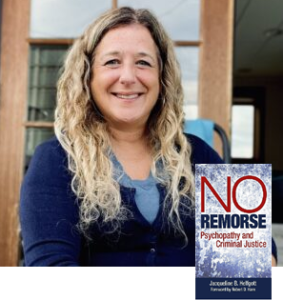Web Conversation with Dr. Maryellen O’Toole
 Dr. Mary Ellen O’Toole is currently the Director of the Forensic Science Program at George Mason University in Fairfax, VA. Before that, she was a Special Agent with the Federal Bureau of Investigation (FBI) for 28 years. For nearly fifteen of those years, she was a “profiler” in the Bureau’s Behavioral Analysis Unit, the Unit featured in the hit TV series Criminal Minds. In that Unit, Mary Ellen worked some of the most violent and complex cases involving serial sexual murders, kidnappings, bombings, and sexual assaults.
Dr. Mary Ellen O’Toole is currently the Director of the Forensic Science Program at George Mason University in Fairfax, VA. Before that, she was a Special Agent with the Federal Bureau of Investigation (FBI) for 28 years. For nearly fifteen of those years, she was a “profiler” in the Bureau’s Behavioral Analysis Unit, the Unit featured in the hit TV series Criminal Minds. In that Unit, Mary Ellen worked some of the most violent and complex cases involving serial sexual murders, kidnappings, bombings, and sexual assaults.
On December 12, 2023, Dr. O’Toole spoke with us about her time with the Behavioural Analysis Unit of the Federal Bureau of Investigation (FBI), as well as possible links between psychopathic traits and the behavior of serial sexual killers. She also spoke about using her knowledge on psychopathy to analyze crime scenes and potentially discern perpetrators’ psychopathic traits, and the desire among law enforcement to understand psychopathy.
Click here to watch the web conversation,
Web Conversation with Dr. Jacqueline Helfgott
 Dr. Jacqueline Helfgott is a Professor in the Department of Criminal Justice, Criminology & Forensics at Seattle University. She is also the Director of the Crime & Justice Research Center there. She has been working in the areas of criminal justice, policing, corrections and re-entry, copycat crime, crisis intervention in law enforcement, and community and restorative justice for many years. She has published extensively in peer-reviewed journals, as well as authoring several books, including her most recent book, No Remorse: Psychopathy and Criminal Justice.
Dr. Jacqueline Helfgott is a Professor in the Department of Criminal Justice, Criminology & Forensics at Seattle University. She is also the Director of the Crime & Justice Research Center there. She has been working in the areas of criminal justice, policing, corrections and re-entry, copycat crime, crisis intervention in law enforcement, and community and restorative justice for many years. She has published extensively in peer-reviewed journals, as well as authoring several books, including her most recent book, No Remorse: Psychopathy and Criminal Justice.
She spoke with us about the ways in which psychopathy is of interest to people in criminal justice and criminology and spoke of the advantages of having psychologists and criminal justice experts learn from each other.
Web Conversation with Dr. Michael Koenigs
Dr. Michael Koenigs is an Associate Professor in the Departments of Psychology and Psychiatry at the University of Wisconsin-Madison and Director of the University of Wisconsin-Madison Neuroscience & Public Policy Program. He spoke with Dr. Rhonda Freeman about the neurological underpinnings of psychopathy, including some of his own research into brain areas that are abnormal in psychopathic offenders.
Click here to watch the web conversation.
Web Conversation with Dr. Angela Book
 Dr. Angela Book is a Professor in the Department of Psychology, at Brock University, St. Catharines, Ontario, in Canada. She spoke to Dr. David Kosson about her investigations into the possibility that people with psychopathy function as social predators. Some of the topics she addresses include the question of whether people with psychopathy are: 1) good at identifying potential victims; 2) good at mimicking (or faking) social emotions, and 3) more willing to take risks (or seek out potentially scary situations).
Dr. Angela Book is a Professor in the Department of Psychology, at Brock University, St. Catharines, Ontario, in Canada. She spoke to Dr. David Kosson about her investigations into the possibility that people with psychopathy function as social predators. Some of the topics she addresses include the question of whether people with psychopathy are: 1) good at identifying potential victims; 2) good at mimicking (or faking) social emotions, and 3) more willing to take risks (or seek out potentially scary situations).
Click here to watch the web conversation with Dr. Angela Book.
Web Conversation with Dr. Adelle Forth
 Dr. Adelle Forth has shared with us some of the key findings from her recent study of the nature of romantic relationships with people with psychopathic traits. Dr. Forth is an Associate Professor at the Department of Psychology, at Carlton University, Ottawa, Ontario. She is the director of the Psychopathy Research Lab at the university and the President of the Society for the Scientific Study of Psychopathy. Although she has conducted research on a variety of topics related to the nature of psychopathy, in this conversation she discusses her work on how individuals with psychopathic traits are able to manipulate and deceive others as well as what it is like to be involved in romantic relationships with them. The title of her research presentation is Toxic Relationships: The Impact of Psychopathy. This web conversation was held with Dr. David Kosson on April 6th, 2017.
Dr. Adelle Forth has shared with us some of the key findings from her recent study of the nature of romantic relationships with people with psychopathic traits. Dr. Forth is an Associate Professor at the Department of Psychology, at Carlton University, Ottawa, Ontario. She is the director of the Psychopathy Research Lab at the university and the President of the Society for the Scientific Study of Psychopathy. Although she has conducted research on a variety of topics related to the nature of psychopathy, in this conversation she discusses her work on how individuals with psychopathic traits are able to manipulate and deceive others as well as what it is like to be involved in romantic relationships with them. The title of her research presentation is Toxic Relationships: The Impact of Psychopathy. This web conversation was held with Dr. David Kosson on April 6th, 2017.
Click here to watch this web conversation.
Web Conversation with Dr. Kasia Uzieblo
 Most psychopathy studies focus on understanding the causes of psychopathy or examining whether psychopathic traits predict criminal justice outcomes. Very few studies have directly addressed the impact of people with psychopathic traits on other people. However, Dr. Kasia Uzieblo, Ph.D., is changing that. She is one of the leading researchers on the social impact of psychopathy. Dr. Uzieblo, a Senior Lecturer and researcher at Thomas More University College spoke with Dr. David Kosson about two research studies, focusing on the socially impact of psychopathy. More specifically the two studies examined the impacts that people with psychopathic traits have on their intimate partner and parent-child relationships.
Most psychopathy studies focus on understanding the causes of psychopathy or examining whether psychopathic traits predict criminal justice outcomes. Very few studies have directly addressed the impact of people with psychopathic traits on other people. However, Dr. Kasia Uzieblo, Ph.D., is changing that. She is one of the leading researchers on the social impact of psychopathy. Dr. Uzieblo, a Senior Lecturer and researcher at Thomas More University College spoke with Dr. David Kosson about two research studies, focusing on the socially impact of psychopathy. More specifically the two studies examined the impacts that people with psychopathic traits have on their intimate partner and parent-child relationships.
Click here to read more about and watch this web conversation.
 Web Conversation with Dr. Paul Babiak
Web Conversation with Dr. Paul Babiak
The recent economic slowdown and transitions that companies are going through are creating a favorable environment for corporate psychopaths. This was just one of the issues raised by Dr. Paul Babiak at the Aftermath Foundation’s Web Conversation on May 19, 2015. In his talk, Dr. Babiak, a leading industrial and organizational psychologist and co-author of ‘Snakes in Suits – When Psychopaths Go to Work,’ provided an overview of the modern-day corporate psychopath.
Click here to read more about and watch this web conversation.
Web Conversation with Dr. Robert Schug
 Neuropsychology is the branch of psychology that examines behavior in specific situations to learn about the functioning of the brain. Dr. Robert Schug, Assistant Professor of Criminology, Criminal Justice, and Forensic Psychology at California State University, Long Beach, spoke with Dr. David Kosson and Aftermath Foundation members about some of his research on neuropsychological functioning in individuals with psychopathic traits. Dr. Schug, in collaboration with Dr. Adrian Raine, Professor of Criminology at the University of Pennsylvania, examined neurocognitive behavioral abilities in individuals with psychopathic traits who are relatively successful versus in individuals with these traits who are less successful.
Neuropsychology is the branch of psychology that examines behavior in specific situations to learn about the functioning of the brain. Dr. Robert Schug, Assistant Professor of Criminology, Criminal Justice, and Forensic Psychology at California State University, Long Beach, spoke with Dr. David Kosson and Aftermath Foundation members about some of his research on neuropsychological functioning in individuals with psychopathic traits. Dr. Schug, in collaboration with Dr. Adrian Raine, Professor of Criminology at the University of Pennsylvania, examined neurocognitive behavioral abilities in individuals with psychopathic traits who are relatively successful versus in individuals with these traits who are less successful.
Click here to read more about and watch this web conversation.

